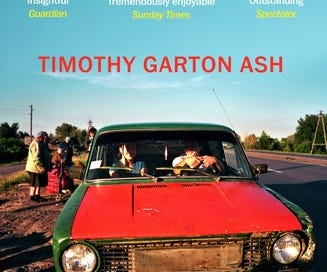Summer Reading
Neither western nor eastern, Austria has its own history concerning immigration in the context of the broader European story
Servus!
This summer, I’ve been reading the British historian, journalist, and commentator Timothy Garton Ash’s newest book Homelands: A Personal History of Europe, which came out in paperback earlier this year. A blend of history, memoir, and commentary, Homelands takes an essayistic, kaleidoscopic approach to its subject which, once the book—which initially feels rather motley and scattergun—settles down and finds its form, offers new ways of conceiving of and thinking about modern European history.
“One calls for a workforce and what arrives are human beings,” Garton Ash quotes the Swiss writer Max Frisch as having said of the German-speaking world’s guest worker program, which began in Austria in the early 1960s. The original misconception of the program, which was designed only with Europe’s various labor shortages in mind, was “the immigrant was treated as a ‘guest worker,’ not expected to stay long-term,” Garton Ash writes. Austria did not make them an offer of what it might mean to stay. As I have written before, it remains true today that Austrians still want the labor but not the laborer.
Thinking about the guest worker program in the German-speaking world and The Netherlands as well as the history of post-colonial migration in the United Kingdom, France, and Belgium, Garton Ash observes an interesting cleavage between one half of Europe and the other. In postwar Europe, just as western Europe was becoming more multicultural, central and eastern Europe—which had been genuinely multicultural, multinational, and multilingual prior to the First World War—underwent a process of “separating-out,” as Garton Ash calls it, through the formation of nation-states for the Poles, Hungarians, Czechs, and so on, and population transfers between those new countries.
What Garton Ash says is broadly true, though there are, of course, exceptions. Germany, in fact, underwent both processes after 1945. It became more multicultural from the 1950s onwards, but not before it had become much more of a monocultural nation state: first, because of the near-total extermination of German Jewry; second, because of the in-gathering of ethnic Germans following their expulsion from central and eastern Europe to the metropole as the Nazis’ imperial project collapsed. To the first development, no analysis of what happened to either western, central, or eastern Europe’s demographics in the twentieth century is complete without due consideration of the Holocaust.
Austria, too, does not fit neatly with Garton Ash’s analysis. While located on the western side of the Iron Curtain, its history prior to 1945 is far closer to that of the central and eastern European states with whom it was once imperially intertwined. Like Czechoslovakia and Hungary, Austria was an invention of the twentieth century, the rump of a defunct land empire. Its founding fathers had not wanted it, the prevailing political wisdom being Austria could not survive on its own and required union with Germany. Only after 1945 did Austria’s political leaders accept the country’s fate and work to construct a new Austrian national identity from the pieces and fragments available to it.
Like Czechoslovakia and Hungary, too, Austria was multicultural prior to the postwar European settlement. During its nineteenth century industrialization and even into the first half of the twentieth century, Austria drew in migrants from across the Austro-Hungarian Empire to work in its factories, cook its meals, and service its apartments. The point of departure with central and eastern Europe is 1945. As the Eastern Bloc became hermetic, Austria continued to be a country of inward migration, be it political and economic refugees from Hungary, Poland, and Czechoslovakia, guest workers from Turkey and the former Yugoslavia, or refugees from Bosnia-Herzegovina, Kosovo, Syria, and Afghanistan. Austria’s history of migration, then, is not so easily categorized. Neither exclusively western nor eastern, it is, perhaps, decidedly Austrian.
Bis bald!
Thank you for subscribing to the Vienna Briefing. Every recommendation helps, so if you know someone who might be interested in reading this newsletter, consider sharing it with them today.
The Vienna Briefing is a reader-supported publication made possible by your donations. If you would like to contribute to my work, think about sending me a tip.
Shooting
Two people were shot and seriously wounded on Yppenplatz on Sunday night after a confrontation between multiple men turned violent. Police found drugs at the scene of the crime, though the investigation into the cause of the shooting remains ongoing.
Rule-Breaking
The far-right Freedom Party’s party secretary Christian Hafenecker has been found guilty by a court in Purkersdorf of data falsification. Hafenecker was fined €5,100 for obtaining a forged COVID-19 test certificate in order to attend a football match in Budapest in June 2021. He has the right to appeal.
Inventing
Green MEP Lena Schilling invented a story about an affair with ORF journalist Martin Thür, the former has been forced to admit following legal proceedings. In spite of questions raised over her professional and personal conduct in recent months, the Greens have stuck by Schilling, and she has taken up her seat in Brussels.





Thanks for this, Liam. The Homelands book sounds like one I would enjoy.